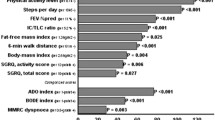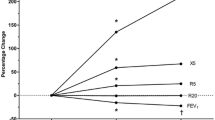Summary
Twenty-four patients with bronchial hyperreactivity due to asthma (8 patients), COPD (13) and of unknown origin (3) entered and completed a randomized double-blind intraindividual cross-over study. Thirteen patients first received the highly selective vasodilatating beta1-blocker Nebivolol (5 mg) and 11 patients first placebo with a wash-out period of at least 2 days. Before the controlled oral intake of the tablets, the patients were challenged with increasing inhalative doses of carbachol between 8 and 9 a.m. according to the recommendation of the German Society of Pneumology. At 10, 11 and 12 a.m. and 1 and 2 p.m. control measurements of airway patency (Raw, FEV1) were performed in the body box. At the same time intervals, oxygen saturation and pulse rate (pulsoximetry) including systolic and diastolic blood pressure were monitored. From 2–3 p.m. the carbachol provocation was repeated as in the morning to assess the changes in hyperreactivity due to Nebivolol. Results During the Nebivolol phase, blood pressure values and pulse rates were significantly reduced compared to the placebo phase. At the same time intervals, no significant changes of the measured body box variables to assess airway obstruction were observed during therapy with Nebivolol compared to placebo. Comparing the measured variables (maximal deviation from base-line values of Raw and FEV1) during carbachol provocation in the afternoon under Nebivolol and placebo with the values in the morning before any medication (base-line values), there were also no significant detectable differences indicating an increase of bronchial hyperreactivity under Nebivolol treatment. Conclusion It seems that Nebivolol in these hyperreactive patients is as safe as placebo despite its significant effect on blood pressure and pulse rate.
Zusammenfassung
Insgesamt 24 Patienten mit bronchialer Hyperreagibilität (8 Patienten wegen Asthma, 13 Patienten mit COPD und 3 Patienten ohne bekannte Ursache) wurden in eine randomisierte, doppelblinde, intraindividuelle Cross-over-Studie aufgenommen. Dreizehn Patienten erhielten zuerst den hochselektiven, vasodilatatierenden Betablocker Nebivolol (5 mg) und 11 Patienten zuerst Placebo mit einer Auswaschphase von wenigstens zwei Tagen. Vor der kontrollierten oralen Medikamenteneinnahme wurden die Patienten mit ansteigenden inhalativen Carbacholdosen am Morgen zwischen 8 Uhr und 9 Uhr nach den Richtlinien der Deutschen Gesellschaft für Pneumologie provoziert. Um 10, 11, 12, 13 und 14 Uhr wurden stündliche ganzkörperplethysmographische Kontrollmessungen zur Erfassung der Atemwegsweite (FEV1, Raw) der O2-Sättigung und des Pulses (Pulsoxymetrie) sowie des systolischen und diastolischen Blutdruckes durchgeführt. Von 14 bis 15 Uhr wurde der Carbachol-Provokationstest wie am Morgen zur Erfassung von Hyperreagibilitätsveränderung wiederholt. Resultate Während der Nebivololphase waren der systolische und diastolische Blutdruck sowie die Herzfrequenz signifikant niedriger als während der Placebophase. Innerhalb der gleichen Zeitintervalle konnten keine signifikanten Veränderungen der ganzkörperplethysmographischen Messwerte zur Erfassung einer eventuellen Nebivolol-induzierten Atemwegsobstruktion objektiviert werden. Auch der Vergleich der maximalen Abweichung der ganzkörperplethysmographischen Messwerte Raw und FEV1 unter Carbachol-Provokation am Morgen ohne Medikation (base-line values) mit denen am Nachmittag unter Verum und Placebo ergab keine Hinweise auf eine Hyperreagibilitätssteigerung unter Nebivololgabe. Schlussfolgerung Obwohl Nebivolol den Blutdruck und den Puls senkt, konnte am untersuchten Patientenkollektiv keine Hyperreagibilitäts- und/oder Atemwegsobstruktionsveränderung im Vergleich zu Placebo objektiviert werden.
Similar content being viewed by others
Author information
Authors and Affiliations
Additional information
Eingegangen: 3. November 2000 Akzeptiert: 11. April 2001
Rights and permissions
About this article
Cite this article
Matthys, H., Giebelhaus, V. & von Fallois, J. Nebivolol (Nebilet®) – ein sicherer Betablocker der dritten Generation – auch für Patienten mit obstruktiven Lungenerkrankungen?. Z Kardiol 90, 760–765 (2001). https://doi.org/10.1007/s003920170096
Issue Date:
DOI: https://doi.org/10.1007/s003920170096




